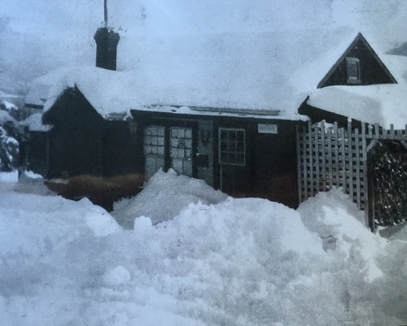 In An Old Cold Grave, Lane Winslow spends time at one of the several abandoned houses in King’s Cove, hoping to find some trace of the family of a dead child. Perhaps because of the finding of the child’s body, or the dark rooms in the cold, damp spring, she is not as charmed by the possibilities of abandoned houses and cabins, as I was as a child.
In An Old Cold Grave, Lane Winslow spends time at one of the several abandoned houses in King’s Cove, hoping to find some trace of the family of a dead child. Perhaps because of the finding of the child’s body, or the dark rooms in the cold, damp spring, she is not as charmed by the possibilities of abandoned houses and cabins, as I was as a child.
I had carte blanche by my dangerously unworried mother to wander around poking about in the abandoned properties in the community. There were houses and biodegrading log cabins that had not been lived in for several decades, but were still full of intriguing and wonderfully hazardous household items…rusty tools, acrid-smelling white powders in tins whose labels had rusted away. It set my imagination ablaze to stand on the collapsing floorboards of these houses with torn curtains, and broken furniture, the cupboards still holding a few cups, or packets of salt or baking powder, and wonder ‘who lived here?’ and ‘Why did they leave their egg beater?’ Had they died, or just, like the people in my book, been unequal to the struggle of survival and packed off to somewhere else?
There was a cabin up the hill from me with a wooden trunk full of damp music books with notes fading off the pages with time and mold, disappearing like the songs from the distant aeons they represented. Inexplicably, amongst them, was a nineteenth century medical book, with, to a child, shocking ink drawing renderings of reproductive whatnots, that thrilled and repelled at once. Behind my own house there was an abandoned building which I had been told was once a school, and I imagined the children, all in black and white, as if there could have been no colour so long ago. Perhaps they too had seen the medical book, and had abandoned altogether the idea of reproducing.
Maybe it was because I had moved so often as a child, or because my mother spoke with such aching longing of the houses out of the mists of her childhood, but these abandoned homes gave me a strong sense of the transiency of human lives. My mother told me of houses where generations of her family had lived, but this was unimaginable to me. Houses have such pretensions to permanence, and yet I probably lived in ten houses in two countries by the time I was twelve. All around me people seemed to pass in ghostly succession through these derelict homes, waking up to mornings they thought they might wake up to each day, forever, only to disappear in a few seasons.
The last time I was in the hamlet by Kootenay lake of my childhood, I visited the property where I have placed the Armstrongs and their little post office, and the house, upon which their cottage has been modelled in my books, is gone…all except one tiny room, set to one side of the grand new house that was built in its place. I stepped into that one room, empty, the walls nothing but weathered boards, nearly dark in the deep shadow of a cold autumn afternoon, and I knew it at once.
It was the little room that had once been a sunny bedroom.
I called back the light, flowered paper on the walls, and a lovely cherry dressing table with a bevelled mirror, and a sparse and neatly made bed with an iron bedstead. I waved my hand, and flowered curtains again fluttered in the warm afternoons of summer days. I put myself on the soft pink coverlet of the bed, a small and excited child, smelling, as I had been allowed to do whenever I wanted, the magical smell of violets, captured in a tiny, deep blue bottle.
I suppose it is really all I want to do now… capture the lost lives and distant times into the magical pages of books. It is one response, I suppose, to the transiency of us all.